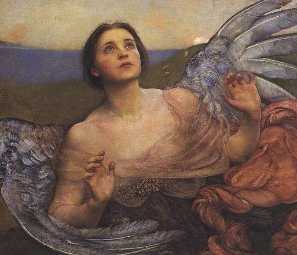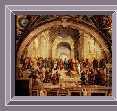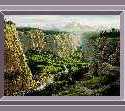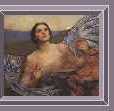
Due to the nature of good ol' HTML programs and limitations, the Development section has been split between Early Literature, Modern Political Fantasy, and an Example of Political Fantasy. The actual (and poorly written) Defense is a bit further down the page.
Yet, several Political Fantasy novels exist and are commercially successful in today's literature. All those fairy tales that touch upon the form of governance-often monarchial-point us to the classical and theological belief that a monarchy is the best form of governance. Tolkein's Lord of the Rings is a literary map of how one king was restored to his throne. C. S. Lewis answers the question of God's presence in any world outside of our own in his Chronicles of Narnia, where the ultimate ruler is Aslan-a metaphor for Christ. Novels such as L. Ron Hubbard's Dune explore the intrigues of a technologically advanced court. Guy Gavriel Kay's Tigana is the study of invasion, revolution and counterrevolution. Theresa Edgarton's several books about the nation of Celydonn carefully reconstruct Medieval society, adding in the impossible element of "magic."
These books, and so many others, begin to apply the possibilities that Emile Zola set out when he proposed "Scientific Fiction." Cite. As exemplified in his novels such as Germinal and L'assomoir, Zola sets up Realistic Political situations, such as the oppression of coal miners in Germinal, places characters within that context, and then "lets them loose," recording their actions as though an indifferent reporter. So, in Germinal, he does not shrink from showing the grime as well as the nobility, the heroics as well as its ultimate futility.
This returns us to the question of language that so consumed the giants of Political Science Fiction. Returning to the swiftly shrinking lexicon, and applying the rules of Political Fantasy, let us examine the short story "Last Words" as an example of Political Fantasy. A world is created: a seaport nation, Medina. Now, on this palate, set the political scheme: the Simplist Commonwealth where words have been stripped down to their basics, with no synonyms or antonyms, no "ambiguities and shades of meaning.37" They do not have the words "beautiful," "wonderful," "gorgeous," "lovely;" they only have the paltry word "pretty." All their words are likewise starved. All mention of God has been purged from the common mind, for the absolute authority must lie with the Simplists. But "it [is] natural to feel there's a God,38" so a new word, Lucience ("light" = "enlightenment") is added as a state, not a deity to be desired. And the afterlife is a sort of Nirvana-esque "Simplicity," where all souls meld together, as opposed to Christ's promise of continued and perfected individuation, "In my Father's house are many rooms.39" Adding in historical background, we learn that:
But the human spirit can not be put down; he will always explore the frontier, no matter how near or how distant. If words are censored, new words-the building blocks of new ideas-will still be coined. And in Medina, they are put on the black market, sold by Hawkers, coined by Dreamers.
Now, the story: a descendent of the Mayvndeist Empire, Solon, is no typical Dreamer, coining ridiculous words ("What was his latest monstrosity? Sjeklyg? Something having to do with preservatives, I think.41") to earn a meal. He is searching for his "Something Other," who is "the highest, of all existing things,42" "something than which nothing greater can be thought43"-God. In his search, he discovers the idea of the Supreme Being, and then the name. So when he is caught by the Watchmen, and is brought to execution, he is asked, jokingly, if he has any last words. Looking out to the assembled crowd, finding the narrator of the story to whom he has explained the idea, he says, "God."
In Medina, there is no magic, no exceptional technology-nothing but the everyday aspects of our life rearranged to form a test world in which to show where our world is going. The subject matter is best set in another world so that the history can be tailored to create the sociopolitical scheme that will result in such a Commonwealth.
Like a funhouse mirror, like a shattered glass, fantasy has the ability to make the reader view himself and his world in a completely different light. The writer of fantasy makes the familiar unfamiliar. As the Romantic poets Wordsworth and Coleridge attempted in their Lyrical Ballads, and Wordsworth explained in his Preface to Lyrical Ballads,
The fantastic can only exist because of the realistic. Yet the world "discredits supernatural stories that have some foundation, simply by telling natural stories that have no foundation.45" Continuing this line, Lewis writes:
This is not to say that the genre is perfect, or that it is used perfectly at all times by all people, authors, publishers and readers alike. So many writers of Fantasy are often writing just to earn a dollar, to put pure emotional and fantastic junk on the page like a mythological cafeteria line. As Huxley and Bradbury warned, so many authors and publishers seek merely to provide a moment's pleasure to the audience, with no concern for longevity, reason, or purpose. One can almost hear those vast hackneyed denizens speaking in concord with Bradbury's Firechief:
Thus say the politics behind literature and all the arts today. But the arts always have been and always will be a counterbalance to the injustices and absurdities of the world. The arts have the power to lift the viewer upwards, towards the sublime, the heavens, and God. The arts, as much as any scalpel in a surgeon's hand, can dissect those elements, so often melded together, that form our world. The arts can bring awareness, as much as they bring pleasure and happiness. The two are not necessarily mutually exclusive.
But in order to achieve this either in the arts, or in literature, or in fiction, or in Political Fantasy, the author must first be grounded in that which is true, good, just and beautiful-the author must be founded in God. Otherwise, all is for naught. Political Fantasy is the study of politics, that is the force-human or divine-that moves and shapes a society, in a fabricated world. Let us not forget the Divine.
35 Volsky, Paula. Illusion. New York: Bantam Books, (c) 1992. p. 19-20.
Here lies the turning point. Political Philosophy and Non-fiction have done their work in bringing man's attention to the motions governance takes. Political Fiction has made its debut and been accepted by those readers longing for more than mere hackneyed "frou-frou." And having even conquered Political Science Fiction, having introduced it to a world normally skeptical of all that is fantastic, what use or precedent is there for Political Fantasy? If the purpose of Political Fantastic Fiction is to take a political situation in this world and extrapolate it; if Politics is often a power struggle between God's rights and man's pride-what benefit is there in placing the problems of this world into a completely different world? How would such a story work? How could it not be rejected as an impossibility? Paula Volsky's novel Illusion exemplifies Zola's criteria, setting up a world of Exalted and oppressed and tracing the lines that lead a society to revolt against its leaders and then against the usurpers. It follows the thread of aristocracy to tyranny to republic by following the Exalted Eliste vo Derrivale as she falls and rises with the society. Volsky adds in several interesting uses of power, such as the Purring to celebrate the seigneur's return in Chapter Two, and the Kokotte, a sort of sentient guillotine, during the book's equivalent of the Terror. Several examples of revolutionary literature are provided, ranging from the moderate Shorvi Nerienne calling for a reform ("the rule of a king and his Exalted is neither a law of Nature, nor yet a historical inevitability. Change is quite possible 35") to the bloodthirsty unfounded cries of Whiss v'Aleur and his Reparationists ("You can get even with the demons, my friends.... You make them pay you back. With interest.36"). The beauty of Volsky's creation lies in her restrained use of magic and her interwoven use of technology. By blending the two, and adding in elements recognizable to the reader as variations on our own history, she makes the Fantasy more readily accessible to any reader, whether a fan of realistic or fantastic fiction.
Paula Volsky's novel Illusion exemplifies Zola's criteria, setting up a world of Exalted and oppressed and tracing the lines that lead a society to revolt against its leaders and then against the usurpers. It follows the thread of aristocracy to tyranny to republic by following the Exalted Eliste vo Derrivale as she falls and rises with the society. Volsky adds in several interesting uses of power, such as the Purring to celebrate the seigneur's return in Chapter Two, and the Kokotte, a sort of sentient guillotine, during the book's equivalent of the Terror. Several examples of revolutionary literature are provided, ranging from the moderate Shorvi Nerienne calling for a reform ("the rule of a king and his Exalted is neither a law of Nature, nor yet a historical inevitability. Change is quite possible 35") to the bloodthirsty unfounded cries of Whiss v'Aleur and his Reparationists ("You can get even with the demons, my friends.... You make them pay you back. With interest.36"). The beauty of Volsky's creation lies in her restrained use of magic and her interwoven use of technology. By blending the two, and adding in elements recognizable to the reader as variations on our own history, she makes the Fantasy more readily accessible to any reader, whether a fan of realistic or fantastic fiction.
But this can be taken one step farther. As was stated previously, Fantasy solely necessitates the creation of an entirely separate world from our own. Although magic or advanced technology are the easiest and most conventional means of achieving a differentiation between our world and the one described in a given book, neither is indispensable to Fantasy. Much of the actual differentiation will lie in the history and geography, and consequently in the customs, society, and, of course, politics. All of fiction is a study of the human soul. Fantasy is the laboratorical study of humans in situations tailored to a particular hypothetical question. The subsequent world created may then, on the surface, resemble our own at first. The exception will be in names, places, events, et cetera. "Two hundred and thirty-six years ago the Theosophic ["God-knowledge"] Wars ended...after five centuries or more of struggle. The Mayvndeists ["Beauty-deified"]lost, the Simplists won. Medina discarded her Monarchy for a Commonwealth. Her liberty for-Simplicity. She strives for Lucience, now; not for [God]. She withdrew from the world, closing her ports and borders to her sister nations. She allowed the sea to cut deeply into her land and created the Valez Ravine. She built Terralucien ["Earth-light"] with its mighty walls and mountaintops, its bleak plains and precise angles. She allowed her words to slip away. And now Medina lies both dumb and blind-without sensation, without thought, without the commerce of ideas and words-fetal."40
"Two hundred and thirty-six years ago the Theosophic ["God-knowledge"] Wars ended...after five centuries or more of struggle. The Mayvndeists ["Beauty-deified"]lost, the Simplists won. Medina discarded her Monarchy for a Commonwealth. Her liberty for-Simplicity. She strives for Lucience, now; not for [God]. She withdrew from the world, closing her ports and borders to her sister nations. She allowed the sea to cut deeply into her land and created the Valez Ravine. She built Terralucien ["Earth-light"] with its mighty walls and mountaintops, its bleak plains and precise angles. She allowed her words to slip away. And now Medina lies both dumb and blind-without sensation, without thought, without the commerce of ideas and words-fetal."40
The principal object then proposed in these poems was to choose incidents and situations from common life, and to relate or describe them, throughout, as far as was possible in a selection of language really used by men, and, at the same time, to throw over them a certain coloring of imagination, whereby ordinary things should be presented to the mind in an unusual aspect.44
But you cannot go on "explaining away" forever: you will find that you have explained explanation itself away. You cannot go on "seeing through" things forever. The whole point of seeing through something is to see something through it.... If you see through everything, then everything is transparent. But a wholly transparent world is an invisible world. To "see through" all things is the same as not to see.46
 Many modern skeptical books do indeed "see through;" fantasy "looks into." The fantastic exists because man sees the realistic for what it is, and sets that transcendental, pure view down on paper. Conventional figures in magical fantasy were created as an allegory to the inner workings of the soul: giants came from a sense of wonder, dragons from a sense of fear.
Many modern skeptical books do indeed "see through;" fantasy "looks into." The fantastic exists because man sees the realistic for what it is, and sets that transcendental, pure view down on paper. Conventional figures in magical fantasy were created as an allegory to the inner workings of the soul: giants came from a sense of wonder, dragons from a sense of fear.You must understand that our civilization is so vast that we can't have our minorities upset and stirred. Ask yourself, what do we want in this country, above all? People want to be happy, isn't that right? Haven't you heard it all your life? I want to be happy, people say. Well, aren't they? Don't we keep them moving, don't we give them fun? That's all we live for, isn't it? For pleasure, for titillation? And you must admit our culture provides plenty of these.47
36 Ibid. p. 156.
37 Orwell, George. "1984." The Orwell Reader. New York: Harcourt Brace Jovanovich, Inc., (c) 1956. p. 412.
38 Huxley, Aldous. Brave New World. New York: Bantam Books, (c) 1960. p. 159.
39 Orchard, Dom Bernard, O.S.B., Reverent R.C. Fuller, D.D., L.S.S., editors. "John 14:2." Ignatius Bible. Imprimatur Bishop Peter W. Bartholome. United States of America: Ignatius Press, (c) 1966. p. 99.
40 Snyder, Emily. "Last Words." (c) 1999. p. 9-10.
41 Ibid. p. 17.
42 St. Anselm. "Monologion." A New, Interpretive Translation of St. Anselm's Monologion and Proslogion. Trans. Jasper Hopkins. Minneapolis: The Arthur J. Banning Press, (c) 1986. p. 65.
43 St. Anselm. "Proslogion." A New, Interpretive Translation of St. Anselm's Monologion and Proslogion. Trans. Jasper Hopkins. Minneapolis: The Arthur J. Banning Press, (c) 1986. p. 225.
44 Wordsworth, William. "Preface to Lyrical Ballads." Readings Honor VII (Honor 401): Fall 1998. Ed. Dominic A. Aquila. Steubenville: Franciscan University of Steubenville, (c) 1998. p. 3-4.
45 Chesterton, G. K. Orthodoxy. San Francisco: Ignatius Press, (c) 1908. p. 49.
46 Lewis, C.S. The Abolition of Man. New York: Touchstone, (c) 1975. p. 86-87.
47 Bradbury, Ray. Fahrenheit 451. New York: Ballantine Books, Inc., (c) 1953. p. 54.


 Back to Introduction to Political Fantasy
Back to Introduction to Political Fantasy Back to Definition of Political Fantasy
Back to Definition of Political Fantasy Back to Development of Political Fantasy
Back to Development of Political Fantasy



 (c) 3 May, 1999
(c) 3 May, 1999
Updated 13 June, 2000
All Rights Held by the Author.
No part of this document may be used or copied without express permission of the author.